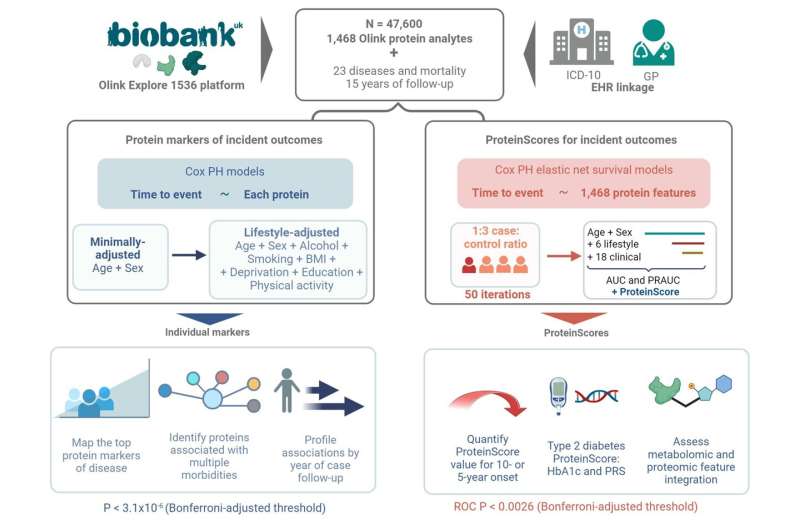This article has been reviewed according to Science X's editorial process and policies. Editors have highlighted the following attributes while ensuring the content's credibility:
fact-checked
peer-reviewed publication
trusted source
proofread
AI insights predict disease a decade in advance

Scientists using cutting-edge AI to analyze medical data have been able to predict a person's risk of developing conditions such as Alzheimer's and heart disease up to 10 years before a diagnosis. For the study, published in Nature Aging, researchers used machine learning to study blood samples from more than 45,000 people.
AI tools were able to identify patterns of proteins present in the blood linked to increased risk of disease, allowing researchers to accurately predict a person's probability of developing a condition before symptoms appear.
Being able to detect early warning signs for a broad set of conditions may lead to opportunities for early intervention and prevention, experts say.
Early stages
The study team, which involved researchers from the University of Edinburgh and commercial collaborators Optima Partners and Biogen, analyzed blood samples from the UK Biobank—a database of genetic and health information from 500,000 U.K. participants.
They used AI and machine learning tools to identify protein patterns in the blood that were indicative of the development of common conditions including Alzheimer's, heart disease and type 2 diabetes.
The disease diagnosis information was taken from the medical records of the participants up to 10 years after the blood sample measurements.
The team then tested whether the patterns could be used to diagnose conditions in the blood samples of a separate group of individuals, whose data had not been used to create the protein patterns.
They found that the protein patterns improved prediction accuracy beyond traditional risk factors such as age, sex, lifestyle behaviors, cholesterol and other commonly measured clinical variables.
Implementation of this form of analysis is not expected to be immediate, but experts say their research is a promising step forward in risk prediction.
"It's encouraging to see how much potential there is from a single blood sample that allows us to predict a range of disease outcomes. Being able to detect early warning signs for a broad set of conditions may lead to opportunities for early intervention and prevention, marking a significant moment for the health care industry," says Dr. Danni Gadd.
More work is still needed to convert these findings for practical use in clinical settings. However, our discoveries set strong foundations for the inclusion of new risk prediction signatures to shed light on possible pathways and mechanisms that underlie diseases.
"Pattern recognition like this would not be possible without modern machine learning technology, and its capacity to analyze data at this scale, and this will in turn allow us to address some of the most pressing health care challenges of our time," says Dr. Chris Foley.
More information: Danni A. Gadd et al, Blood protein assessment of leading incident diseases and mortality in the UK Biobank, Nature Aging (2024). DOI: 10.1038/s43587-024-00655-7





















